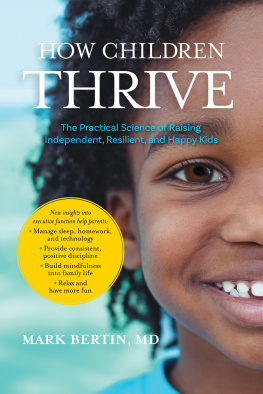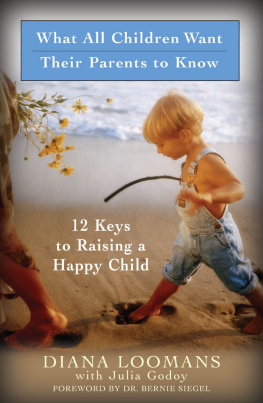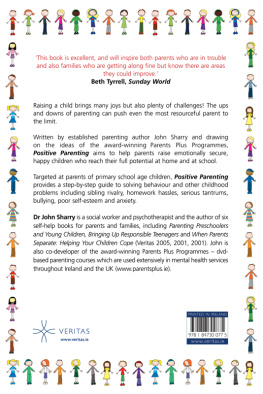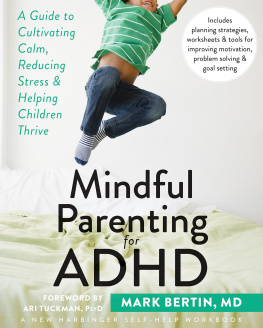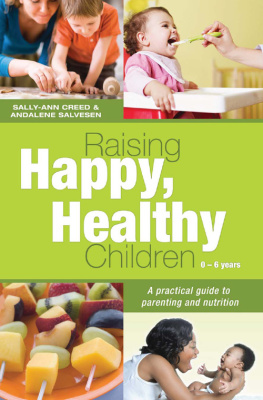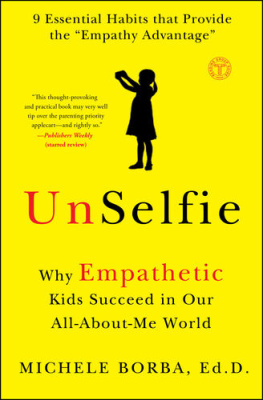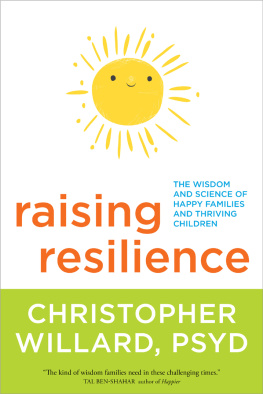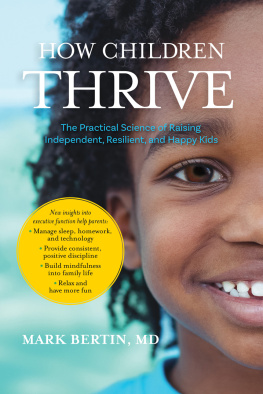
With love and appreciation to my one wife,
two children, three parents, four grandparents,
and the rest of my extended family and friends
Contents
Foreword
I FIRST MET MARK BERTIN, MD, when he emailed me about a mindfulness group he was leading for parents out of his pediatrics practice in New York. We stayed in touch in the years after and finally met in person at the wonderful Mindfulness and Youth Conference in San Diego. What started as an email turned into handshake, then a weekend of swapping stories and science about child development, mindfulness, executive function, and more. I squeezed every moment out of the conference breaks to talk with him. Some evenings, we chatted late into the night, rattling off new inspirations and ideas about parenting, pediatrics, psychology, mindfulness, and more. Thats because Mark is a guy with amazing ideas.
Since that time, Ive been both honored and grateful to say that Mark Bertin has become a friend and collaborator. Ive devoured and recommended his books to colleagues, friends, clients, and anyone else who will listen. But nothing has excited me more than this book you are holding in your hands right now in this very momentone that every parent and child professional should have on hand in their office or on their nightstand, or maybe both.
How Children Thrive offers a scientific yet straightforward guide for raising thriving healthy and happy children. You will find pearls of wisdom on every page and down-to-earth, real-world advice for all manner of challenges that families face in the 21st century, from screen-time battles to social media madness. The irony is a lot of the advice youll find in here may sound old-fashioned, and yet it still resonates for families todayand whats more, has solid research backing it up.
Too many of todays parenting books offer only trendy, simplistic opinions and theories masquerading as books. Not only do they rarely look at the research, they are often just one or two ideas that could fit into a few bullet points on a PowerPoint presentation that have somehow been stretched into a few hundred pages.
What Mark offers in the few hundred pages you hold in your hand is a masterful book that includes depth, breadth, and elegant simplicity, with a new insight on every page. Along with the guidance he presents in the book, Mark encourages parents to take advantage of community resources, assuring us that parents of any financial means can raise resilient, successful kids. Further, How Children Thrive is written to fit into parents busy lives. You can read just a few pages at a time before falling asleep after a long day of work and play.
Beginning with a clear description of what executive function actually is, the book unfolds into an explanation of how we can cultivate executive function and resilience in our children, thus building healthy, happy brains and bodies to last a lifetime. With real-world advice about screens and other distractions, Mark understands the challenges the 21st century presents to all parents and families. And with his advice on self-care and mindfulness for busy parents, he truly helps us put on our own oxygen mask and breathe so that we can best attend to our families.
It is my wish for you that you treasure this book, and in so doing have children who grow up to treasure their own childhood and lives as they continue to thrive.
Christopher Willard, PsyD
Cambridge, Massachusetts
Introduction
LIFE AS A PARENT may sometimes feel full of pressure and chaos, but it is my hope that this book offers more simplicity and ease instead. By understanding how children develop self-management skillsvarious cognitive abilities that build resilienceso much falls into place about our family life. Parenting is complicated and full of uncertainty, but when we stick to what helps children thrive and let go of much of the rest, our lives and theirs become far easier.
Specific developmental skills act like the CEO of a business, keeping track of the big picture. They are involved with coordinating any life experience that requires persistence, planning, and organization. They are vital for problem-solving, navigating social situations, and monitoring our own behavior. They also dictate much of how children learn in the average classroom and how they manage daily routines. These skills, together often called executive function, or EF, as I refer to it in this book, tie together everything for parents, from the why and how of discipline to easier bedtimes to explaining the real-world benefits of mindfulness. A growing body of research shows that strong executive function sets up children for lifelong success.
Modern family life has become more complicated than ever, especially as we find ourselves increasingly bombarded with advice about raising children. Pushed to extremes, we are given the impression that even the smallest decision, from buying a toy to taking a swim class, may have a lasting effect on our children. The pressure to be the perfect parent is overwhelming. But the truth is, the job is too challenging and varied to ever be done to perfection.
Far too often, a deluge of contradictory information bogs us down rather than helps us make decisions clearer. Everyone from our mother-in-law to our best friend to the author of the hottest celebrity advice book claims to know best. We scramble to keep up with the latest recommendations, even though practically no one seems to agree on how to raise children. Youre either pro this or anti that; parenting itself has become political. Overly strident online discussion makes us feel that if we do not listen to what they say, mayhem will fall upon our homes.
As a parent and developmental pediatrician, I have found that by moving above the swamp of advice, product placement, and Internet-driven anxiety, there is a more straightforward way to raise children. The world changes, but kids stay the same. At the heart of this book lies a developmental path related to self-management skillsexecutive function. Most kids walk near one year old, talk near one year old, and eventually learn to handle themselves responsiblybut not right away. When we stick to the common-sense, proven essentials shared in this book, life gets simpler and children become far more likely to thrive.
Attending to simple truths, tying together decades-old experience with cutting-edge research about children, we can let our minds rest knowing we have done our best. Plenty of practical science shows what impacts development most. There are few absolutes, but thankfully, between what has proven useful and what has been shown unhelpful, theres a lot of open ground to be ourselves. As it turns out, much of what supports children simplifies modern livingguiding children toward resilience and happiness doesnt mean one more thing to doits quite often one thing (or more) less.
guides parents around mindfulness and family. Each chapter in the book is concise, can be read on its own (helpful if you get too busy for a while to read the whole book), and ends with something concrete to reflect on or try.
With the executive functionbased insights provided in this book, youll discover a more relaxed, balanced way to raise children. My hope is that youll also have more fun, without getting lost in parenting worry, swept up in fads, or giving in to pressure to push your children too far or too soon. Child development is a pathand often a winding one. Yet there is an easier way forward. When we meet children exactly where they are developmentally, they flourish and find the balance and joy that allows them to thrive.
Part I
BRAIN MANAGEMENT AS A DEVELOPMENTAL PATH
Next page
